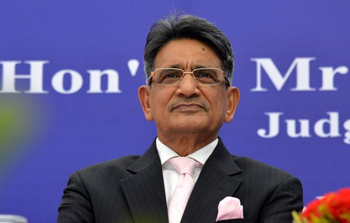 New Delhi, Aug 5: Chief Justice of India R M Lodha on Monday promised to look into the complaint of a woman judge, who quit as additional district and sessions judge of Gwalior, levelling sexual harassment charges against a sitting judge of the Madhya Pradesh High Court.
New Delhi, Aug 5: Chief Justice of India R M Lodha on Monday promised to look into the complaint of a woman judge, who quit as additional district and sessions judge of Gwalior, levelling sexual harassment charges against a sitting judge of the Madhya Pradesh High Court.
The woman judge accused the administrative judge of the HC of demanding sexual favours. She alleged that he wanted her to “dance to an item number” after showing “more than normal interest” in her work.
The accused judge, however, rejected the charges and offered to face death penalty if the allegations were found to be true. Justice Lodha told PTI, “It is a very serious issue. All versions will have to be taken into account. Let me go through it.”
An email making the allegations has been received by the SC registry, and was being dealt with appropriately, sources said. The CJI said he would deal with the issue appropriately when the papers are placed before him as “the matter cannot be left like this”.
In her nine-page representation to the CJI, the woman judge, who herself headed a sexual harassment committee set up under the Vishakha guidelines at the district level, stated that the HC judge had some months ago started showing undue interest in her work and had gradually started making “coloured remarks” about her.
Her complaint narrated an incident in February this year at the marriage ceremony of a judicial officer where the high court judge had allegedly told her, in the presence of her 16-year-old daughter, that her work was excellent but “you are more beautiful than your work”.
In December last year, the wife of a senior judicial officer had telephoned her to tell her that the judge was eager to see her perform a dance to an item song at his marriage anniversary, she said.
As she refused to give in to “malicious aspirations” of the HC judge, she claimed that she was transferred from Gwalior to Sidhi in the middle of her daughter’s academic career.
According to her complaint, she made a representation against her transfer but her plea was not heard.
Thus, she resigned on July 15, “in compelling, humiliating and disgraceful circumstances to save my dignity, womanhood, self-esteem and career of my daughter.” Responding to the woman judge’s allegations, the high court judge wrote to the Chief Justice of the Madhya Pradesh High Court describing the allegations as “totally false” and expressing his willingness to face a probe by the CBI or any other agency.
“If any allegation is proved I am ready even to face death penalty,” the judge said.The accused judge’s letter has been forwarded to the CJI by the Chief Justice of the MP High Court.
In Jabalpur, the Madhya Pradesh High Court described as “distorted version”, reports that the complainant woman judicial officer had sought an appointment with the High Court Chief Justice to apprise him about the factual position and it was declined.
“The lady ex-Judicial Officer, who was posted at Gwalior since August 2011, was transferred in July 2014 to Sidhi on administratve grounds. Her two representations seeking cancellation of the transfer on the ground of her daughter’s education were duly considered and rejected by the Administrative Committee of the High Court. She has not represented about alleged misbehaviour or harassment caused to her by anyone,” it added.
In a related development, a PIL was filed in the Supreme Court by advocate M L Sharma, seeking judicial inquiry into allegations of the woman judge and prosecution of the accused judge.





Comments
Add new comment